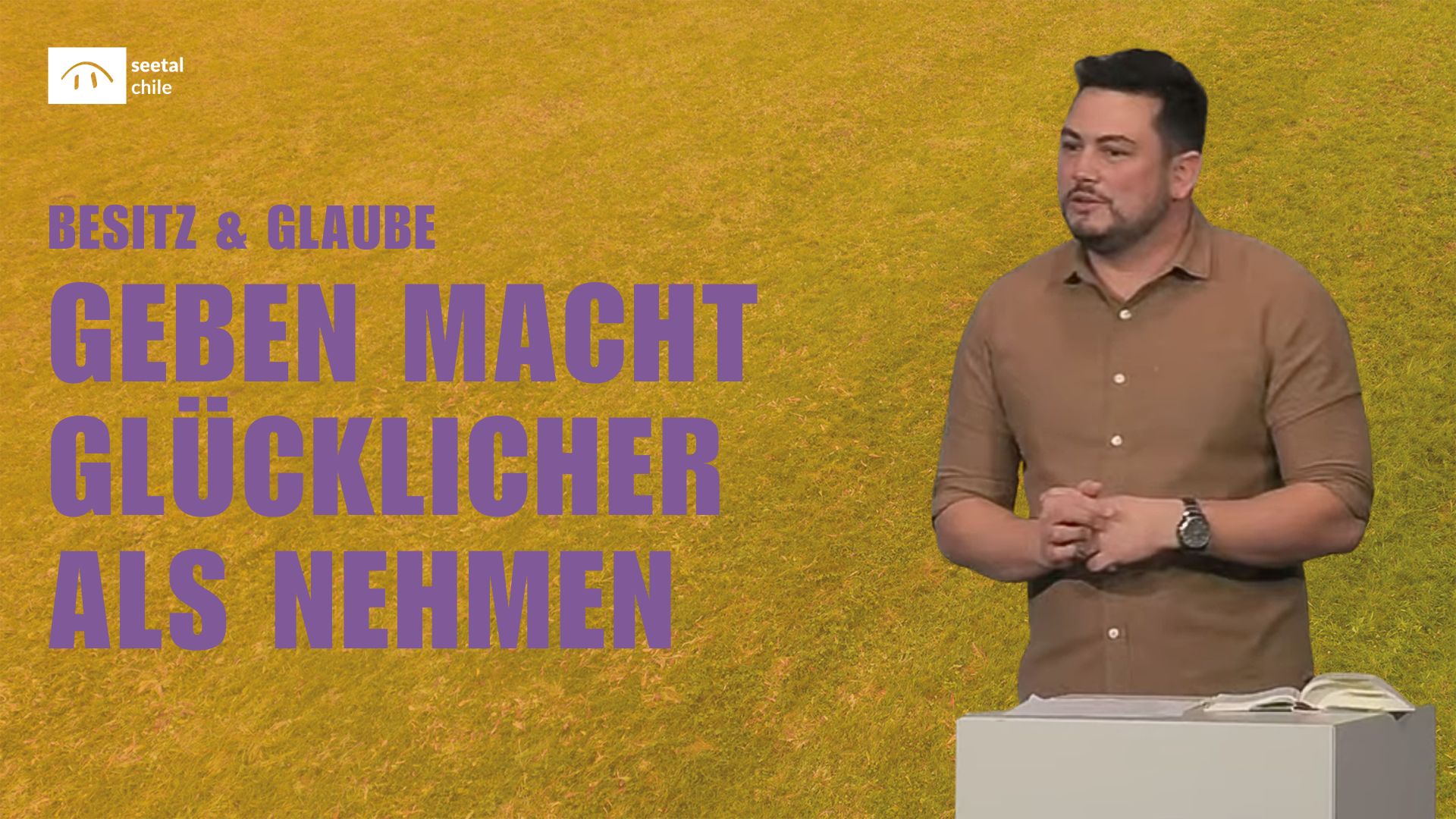State | by the grace of God
Series: EIFACH muetig – with Jesus as a role model | Bible text: Romans 13:1–3; Matthew 5:13
God created the earth and he wanted to establish order on the earth. This has its roots in the heavenly order. The key point here is that God is the King! This is why Israel had no king for a long time. However, the people increasingly said goodbye to theocracy and wanted a monarchy. No matter what form of government we live in, we should submit to it. Followers of Jesus are not called to criticise things, but to live as the salt of the world. The problem of the world is not the corruption, obsession with power, injustice or oppression that can emanate from the state. Rather, the problem of the world is that the followers of Jesus, as the salt of the world, are no longer salt.
Why is it important that there is an order, a state? And how should I behave within it as a follower of Jesus? Today, the focus is on the fact that every state ultimately goes back to God. In a sense, it exists by the grace of God.
Order according to the heavenly model!
The origin of the entire theme lies in the creatureliness of all things. Everything was created by God and so creation is the standard for everything. At the moment, especially when I’m at the gym twice a week, I listen to Christian lectures or sermons. At the moment, I’m listening very often to Lectio Continua by Professor Benjamin Kilchör. In over 100 episodes, he goes through the Old Testament verse by verse. He has now reached chapter 12. I haven’t got that far yet, but what strikes me is that there is nothing new under the sun. There are connections between the Old Testament, the Gospels, the letters and Revelation. In order for us to understand the world, it is important to look at the beginnings. Today we want to do this on the basis of creation and man’s mission. «Then God said: «We want to create people after our Imagethat are similar to us. They shall rule over the fish of the sea, the birds of the sky, all cattle, wild animals and all creeping things. prevail.» So God created mankind in his own image, in the image of God he created them; male and female he created them. And God blessed them and gave them their mission: «Be fruitful and multiply, bevöClear the earth and take possession of it. Reign üabout the fish in the sea, the Vögel in the air and over all the animals on earth» » (Genesis 1:26–28 NLB). What do the emphases refer to? There is some debate. Some refer to a «pluralis majestatis» – to God speaking of himself in the third person. Others interpret it to mean that God is speaking to a group of people here. But to whom? There are two possibilities here in particular. On the one hand, that it is intra-Trinitarian. God is speaking here to himself, Jesus Christ and the Holy Spirit. On the other hand, and much more plausible, is that God is speaking to a heavenly throne council or court. In other words, God is speaking to the people of the heavenly world. There is some evidence of this in the Old Testament. «Then Micaiah continued, «Hear therefore what the LORD says! I saw the LORD sitting on his throne, surrounded on the right and on the left from the heavenly hosts» (1 Kings 22:19 NLB). Another example is the calling of the prophet Isaiah: «In the year that King Uzziah died, I saw the Lord. He sat on a high throne and was exalted, and the hem of his robe filled the temple. ÜSerafim floated above him with six flügeln. […] Then I heard the Lord ask: «Whom shall I send? Who will be us go?» And I said: «Here I am, send me» » (Isaiah 6:1–2. 8 NLB).
The following can be summarised from Genesis 1:26–28. Namely, that there is a throne council of heavenly beings. Humans, in turn, were created to form an earthly throne council. However, this alone says nothing about the form of government. Furthermore, humans were created in the image of God, just as the heavenly beings are also images of God. This likeness includes the task that the beings in heaven also have: They are to represent the reign and glory of God! This last point is reflected in the preamble to the Swiss constitution, among other things. «In the name of God Almighty! The Swiss people and the cantons, in our responsibility towards creation[…] adopt the following constitution:» (Federal Constitution of the Swiss Confederation).
According to God’s mandate, man’s mandate also includes ruling. But what does this mean? The Hebrew word «radah» means the exercise of authority over nations or other persons. This is said of kings and also occurs twice in this passage. However, this does not imply that the rule must always be good (Ezekiel 29:15; 34:4). But it can very well be meant positively (Leviticus 25:43; Psalm 110:2). In principle, however, it can be said that man has a special place in creation.
Theocracy as a form of government
So what is the perfect form of government? The challenge is that this lies at the core of being human: Namely, not to seek salvation elsewhere than with God. The state is not God, but it can become God. But the first commandment of the so-called 10 commandments is this: «You shall have no other gods but me» (Exodus 20:3 NLB). What is a state about? In the most positive sense, it is about regulating how people live together. The second part of the Ten Commandments plays an important role here. It is about loving your neighbour. The first part of the commandments regulates the relationship with God and the second part the coexistence of the Israelites. The pivotal point is the covenant that God has made with the people. The love of God and also the love of one’s neighbour emanates from this covenant – ultimately the entire coexistence in the community.
The people were unique in many ways. Roughly speaking, there were two types of leadership in those days. Either there was a king who saw himself as a god (Pharaoh). Or there was a king who had a god at his side. If the king was strong, so was their god. But the people of Israel were different. They originally had no king. However, they had various leaders appointed by God – so-called judges and prophets. These provided religious leadership. Because God was the king of the Israelites. But people today want more. They don’t just want to be ruled by God. The history of the Israelites is also characterised by the desire for a king. For a time, Samuel was the leader of Israel. As we heard in the text reading (1 Samuel 8:5–22), the people demanded a king towards the end of his reign. Samuel now seeks advice from God: « «Hör to the voice of the people, to everything they say,» the LORD answered, «for it is not you they point toück, but me. They don’t want to let meäthan aönig. They are doing what they have always done since I brought them here from Egypt. Because they have always forgotten me and run after other gods. And now they are doing the same to you. They inventüll her request, but warn her clearly not to act like a König üwill rule over them.» » (1 Samuel 8:7–9 NLB). Although this way of the people was a rebellion against God, he went this way with them. But the history of the kings of Israel shows that it was never easy with the kings. God had indeed decided in favour of a theocracy. But it is not as if there were no other ways. God knew that one day the desire for a king would arise (Deuteronomy 17:14–20). But this king was to be different from other kings around him. Above all through a modest life and «[…] he shall read it every day as long as he lives, so that he may learn to treat the LORD his God with the necessary reverence and to observe all the precepts of this law conscientiously. This will prevent him from exalting himself above his countrymen or deviating from the commandments in any respect. Then he and his descendants will reign in Israel for many years» (Deuteronomy 17:19–20).
Times have changed. We live in a democracy today, which I think is a great thing and for which I am eternally grateful. But the principle of God has not changed. He wants to be the King of me! Yesterday, today and tomorrow! Regardless of the state system in which I live. This is how followers of Jesus can testify with Isaiah. «For the LORD is our judge, the LORD is our lord, the LORD is our king. He will save us» (Isaiah 33:22 NLB). Unfortunately, however, it is also in the nature of human beings to constantly turn other things into God (e.g. the state, wealth, Netflix, social media, sport, family, career, holidays).
Obey the government
We have now taken a short journey through history. Starting with creation, moving on to the people of Israel and now we want to land in the New Testament. When it comes to the state, there is a classic of New Testament texts, namely Romans 13:1–7. Today we will dive in briefly, but next Sunday we will look at it in more depth. «Obey the government under which you live, for it is instituted by God. All governments have their authority from God. So anyone who opposes the laws of the land is refusing to obey God himself and will be punished. Those who act in an exemplary and good manner need not fear the rulers.üonly the müare suitable forüRighteousness to those who do wrong. Therefore, do what is right and you will even be rewarded for it.ür be praised» (Romans 13:1–3 NLB). In my opinion, the statement that all power is instituted by God has its roots in the heavenly and earthly throne councils. It is given to man to exercise power on earth. Unfortunately, this passage has also been misused time and again to legitimise oppression. But this text is not about the authorities, how they should act or what they can demand, but about how I behave down here. It is about how I, as a follower of Jesus, should not attract negative attention.
What is the goal of a state? Characterised by the idea of the throne of God on this earth. It is therefore about order in this world. However, this does not legitimise every action. Rather, as N.T. Wright says in his commentary on the Romans passage: «All that is being said is that a world in which evil thrives if it is not confronted always needs some form of government» (N.T. Wright). The task of every state, which is made up of people, is to represent the glory and reign of God.
St Paul wrote these lines under the notorious Emperor Nero. After the fire in Rome, he searched for culprits and found them in the followers of Jesus. He killed hundreds, sometimes using them as living torches for his gardens. Paul probably wrote this text in earlier times. So it wasn’t that bad, but the system has always been full of injustice and arrogance. What Paul is saying here is not simply a confirmation of the claim of the rulers of the time. After all, the idea that the emperors were appointed by God was a new one. Rather, they believed that they themselves were God and that the right to rule came from themselves. But Paul points out that every government has its authority from God. The authority comes from the Creator God.
So how should I behave in the state? Today, we want to use our theme for the year, «EIFACH muetig – mit Jesus als Vorbild» (EIFACH muetig – with Jesus as our role model), to give us some final thoughts on this. Paul, who wrote the letter to the Romans, and Jesus himself would have had plenty of things to criticise about the state. Certain things do indeed flash up, as we have also seen in the letter to the Romans. But in contrast to the Old Testament, we do not find any large-scale criticism of the state. Rather, the criticism that is levelled is directed at believers or the religious leadership. Jesus Christ says: «You are the salt of the earth. But what good is salt if it has lost its flavour? Can it be made usable again? It is thrown away and trampled on like something that is worth nothing» (Matthew 5:13 NLB). The problem is not the corrupt, aggressive, unjust, oppressive state. The problem is followers of Jesus who are not doing their job. As followers of Jesus, we have so much to give to the world. Especially to the state. The question as a follower of Jesus is therefore not, what does the state have to offer me, but: What do I have to offer the community because of my discipleship? This is unconditional love of neighbour. We will come back to the charisma and the consequences of this next Sunday. But how can I be this salt? In this passage, Jesus talks about his followers being salt and light. In the New Testament, Jesus speaks of himself as the light of the world (John 8:12), so I take the liberty of saying that he is also the salt. He was the salt for the world in the form of purifying and preserving. And what about me? I can dock with him. If I stay with him, he will salt my life. Then I will never want to be without this salt again. Filled with it, I can perceive this salt power. Without this, it is self-motivated, activist and without effect.
So what is my advice for you? Follow Jesus «EIFACH muetig». Treat your government with respect. Pray for them (1 Timothy 2:2). Stay connected to Jesus. And – continue to salt your place well!
Possible questions for the small group
Read Bible text: 1 Samuel 8
- Man is to represent the reign and glory of God on earth. How could you realise this where you are? Resp. how are you already doing this?
- Is Jesus king over your life? How does this manifest itself? To what extent are you in danger of becoming dependent on the state and its benefits, securities, etc.?
- «Obey the government under which you live, for it is instituted by God. All governments have their authority from God» (Romans 13:1 NLB). What does this invitation trigger in you?
- How about giving thanks in prayer for the government and praying for them (1 Timothy 2:2)? Especially for those politicians, opinions and movements that do not agree with you? Note: Do not pray against them, but FOR them.
- What does this statement trigger in you? The problem is not the corrupt, aggressive, unjust, oppressive state, but followers of Jesus who do not fulfil their task (salt that no longer salts; cf. Matthew 5:13).




